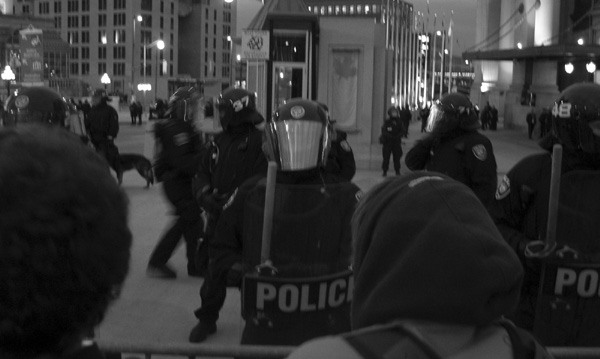The term ‘simulated drowning’ is another neologism in the authoritarian vocabulary of the so-called ‘war on terror’. As with ‘extraordinary rendition’ (kidnapping and removal to torture), ‘enhanced interrogation technique’ (torture), and ‘enemy combatant’ (prisoner denied legal status), ‘simulated drowning’ attempts to deny something by giving it a different name. Truth is obscured by official jargon and technical terminology.
‘Simulated drowning’ – the oft-quoted official explanation of ‘waterboarding’ is a particularly problematic term because it dodges the truth by qualifying something that is normally absolute. Most dictionaries will tell you that to drown is to die by submersion (suffocation / asphyxiation) in liquid. Suffocation or asphyxiation involving liquid that does not lead to death does not seem to constitute ‘drowning’. Drowning falls into the same category as electrocution in this regard, though at least in the latter case you can capture the essence of the action with terms like ‘electrify’ or ‘shock’. We're dealing with a failure of language here.
You can be burnt to death, or simply burnt. You can’t really be drowned to death, since the former implies the latter. If the CIA was applying flames or heat to detainees, we would call it ‘burning’ and denounce it as torture without hesitation. It wouldn’t be ‘simulated burning’ (though the
It makes things seem a lot less serious than they are (‘simulation’ always makes me think of computer programs or Baudrillard’s musings on the First Gulf War). By all accounts (but I highly recommend this one), waterboarding is a truly terrifying experience, likened by many to a paralyzing slow death. It is simulated only insofar as it deliberately uses a militarized knowledge of biology to force the body to react as though it was drowning; water is forced in the mouth with a cloth or plastic wrap covering the face, and ‘real’ drowning – death by suffocation – can occur. This is torture.
I would like to see media outlets shrug off their fixation on ‘official’ accounts, throw away their newspeak dictionaries, and begin to engage critically with language. Our contemporary political discourse is riddled with evasive concepts that excuse and mask authoritarian actions. In order to truly challenge these actions, we have to give them names that reveal (unofficial) truths. It’s a daunting task, and part of a social project that goes well beyond the media. But the media can help to lead the way by rejecting terms like ‘simulated drowning’. Suggested alternatives include ‘asphyxiation’ or ‘suffocation’. Or just ‘torture’.

No comments:
Post a Comment